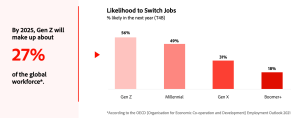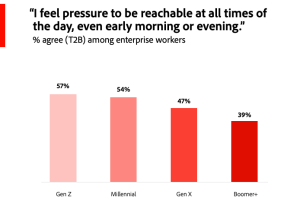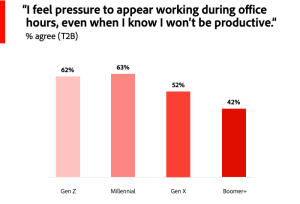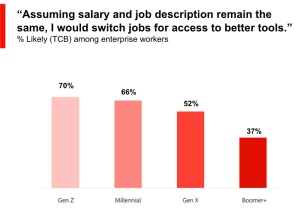You may have heard the recent term “The Great Resignation” but never bothered to ask questions about what it actually means. This phenomenon, also called the Big Quit, refers to the large number of millennials quitting jobs in 2021 and beyond. The term refers to a mass exit of employees from their jobs and has become overwhelmingly pervasive in the months since spring 2021.
However, while the topic tends to focus on millennials quitting jobs in 2021, that doesn’t define the entire issue. This article will look at which generations are involved in the Great Resignation, what needs and goals these generations have, and ways to retain employees while moving toward the future.
What generations are taking part in the Great Resignation?
We’ve mentioned many people define the Great Resignation as millennials quitting jobs in 2021, but that’s not the entire story. The Great Resignation isn’t entirely focused on millennials. It also involves Generation Z. In short, the younger generations are the ones who are choosing to leave their jobs in search of greener pastures. So what age group is quitting jobs the most?

Based on The Future of Time Global Study by Adobe, while other generations might take part in the Great Resignation, the vast majority are from Gen Z or millennials. This is important to be aware of when trying to retain employees who are at the largest risk of leaving the job over the next few months or a couple of years.
To put things into perspective, almost half of all Gen Z employees intend to switch jobs within the next year. It’s also worth being aware that by 2025, Gen Z is expected to make up more than a quarter of the entire workforce. Being aware of what they want from an employer may put you in a position to prove your company is worth staying at.
Why are Gen Zs and Millennials leaving jobs then? When looking at two job descriptions that are similar with the same pay, younger generations often choose to switch jobs for better work-life balance. This is at a rate of 74% for Gen Z and 78% for millennials. The next most common reason to move on is to have more control over the work schedule, with Gen Z citing this 66% of the time and millennials 73%. The final of the three top reasons is the ability to work remotely, which 63% of Gen Z and 66% of millennials prefer.
5 Reasons Why the Younger Generations are Leaving Jobs
1. Unproductive and Inconvenient Work Schedules
Is it true Millennials don’t want to work? Why are millennials quitting jobs in larger amounts than other employees? There are a few different reasons. One of the top issues is that younger workers feel they are requested to work at times when they are not the most productive.
According to Adobe, about 62% of Gen Z workers and 63% of millennial workers feel as if they need to be in the office during specific hours, such as 9 to 6. However, many of these younger employees feel more productive at later hours and favor jobs that allow them to work at those times.
So before assuming the issue lies in the work ethic of younger generation employees, it may be more helpful to explore options for optimizing their work experience to be tailored to their availability and strengths.
2. Frustrated by Lack of Modern Efficiency
Many of the younger workers out there feel as if they should have better tools that allow them to do their job more efficiently. Both millennials and Gen Z have grown up around technology and understand its importance for both work and play.
These workers may feel frustrated when forced to use outdated tools that slow them down and be less productive. This may lead them to move to other positions in companies that have cutting-edge technology and tools that create a more efficient working environment.
3. Lack of Work-Life Balance and Boundaries
The final of the three most significant reasons behind millennials quitting jobs in 2021 and 2022 is that these generations struggle with the pressure to be “always on.” Many younger workers feel as if they must be available for their place of employment. For instance, they think they have to be reachable by phone or email in the early mornings before work or in the late evenings when work is done.
Here is what 5,500 workers in the United States, the United Kingdom, Germany, France, Australia, New Zealand, and Japan said:
Younger generations struggle with the pressure to be “always on”:

Younger workers feel they are requested to work when they are not most productive:

Younger generations want better tools that make them more efficient:

The modern workspace is changing. New flexible and technology-enabled ways of working are becoming increasingly important if you’d like to attract and retain young professionals.
4. Lack of Remote Work Options
Many young workers want to work remotely but are in positions that do not allow it. These employees want more freedom to work where they want when they want. The ability to travel and explore the world is precious to these workers and remote options would open up opportunities. The ease of online work also plays into this reason to move to new companies.
5. Risk-taking after saving up during the pandemic
Many who had good jobs throughout COVID-19 saved more money over the main timeframe of the pandemic due to less social activities and travel. Moving out of the workplace and taking career risks feels safer when savings are available. It gives these employees a way to try new things and enjoy new opportunities outside of their current job.
How to Retain Employees Through the Great Resignation
Now that you have insight into what millennials quitting jobs in 2021 and 2022 are looking for and why they’re moving on, you might wonder how you can keep them from resigning from your company and focus on employee retention.
One thing to be aware of is that these workers are looking to be on high-performing teams with a healthy culture. Paying more isn’t always enough to drive changes. Improving equity, fairness, and transparency is essential. The below ideas can be implemented to ensure millennials quitting jobs in 2021 aren’t leaving your company too.
- Allow Flexibility – The future of work is a flexible work environment in terms of career paths, job descriptions, times, and places. Implementing that now is a great way to ensure your employees stay happy with your organization. Loosen up on specific hours and locations to work. Consider workers who may not fit every “qualification.” Embrace what’s coming in the future.
- Focus on Connection and Culture – Work matters but equally important is building connections with employees. This helps create a relationship and has a positive impact on productivity. Many employees prioritize relationships with coworkers over other factors when it comes to leaving or staying.
- Let Employees Grow – Resignation can happen when people aren’t able to move up. Make sure you’re using the skills of each employee to better themselves and the organization. Show you care about these workers by letting them learn and advance. Many are happy to learn new things or retrain old skills.
- Consider Purpose – Every company needs a purpose. It’s what gets people to join and stay. When things are turbulent in the world, purpose can be more important than ever. Show employees that you care about more than revenue. Instead of only talking about purpose, make sure you use it to shape the way the business runs.
While the Big Quit may still be happening, it doesn’t mean you have to surrender to the movement. Instead, take action to ensure that you retain your employees by providing what they need. Use some of the recommendations above to make sure you keep roles filled and employees happy.


